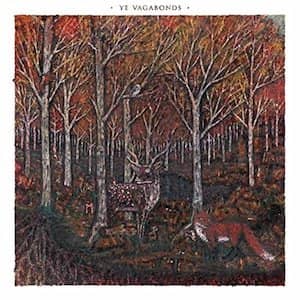 Ye Vagabonds – Ye Vagabonds
Ye Vagabonds – Ye Vagabonds
Inglenook Records – 13 October 2017
Irish duo Ye Vagabonds comprises brothers Diarmuid and Brían MacGloinn, who hail from Carlow in the south-east. Since moving to Dublin in 2012, they have become a regular and welcome presence on their nation’s vibrant live music and session scene, which at least partly explains the air of natural and mature accomplishment that comes across in spades on their eponymous first full-length album (though I understand their actual debut on record was a 2015 EP, Rose And Briar (which also featured on a Dublin Showcase show here on Folk Radio UK last year). Perhaps unusually for session-habitués, though, Ye Vagabonds possess a strong and distinctive musical identity that, while embodying some familiar sensibilities, fair celebrates its own individuality and certainly stands out from the crowd.
Their music is mellow and richly textured, with beautiful instrumental sounds and sibling-style harmony vocals. For on this album Diarmuid’s vocals and guitar and Brian’s vocals, bouzouki, fiddle, mandolin, banjo and guitar are augmented by Alain McFadden (vocals, harmonium, mandolin) and Nicholas Cooper (violin, viola and string arrangements). Even so, and although that means you’re less likely to hear the brothers strictly on their own, there’s no loss of intimacy in the recordings on their album, which were made variously in Delgany, Co. Wicklow and in Castletownend, West Cork by Nick Rayner. The brothers’ slightly earthy vocal qualities are set into close relief, as much by the analog nature of the recording as by the close-miked unison (octave) and harmony parts supporting the main lead.
Only last year the brothers supported Roy Harper, who gave them a hearty and well-deserved endorsement in which he recalled his own early days at Soho’s Les Cousins. The shortest track on the album, the two-and-a-quarter-minute For Bert, is a nifty Jansch-styled guitar interlude piece that pays direct homage to the inspirational guitarist. Elsewhere, though, it’s other later-’60s icons that are evoked: Sweeney’s Men for certain on the album’s one traditional number Lowlands Of Holland (a suitably fiery reading, done to a tune inspired largely by Paddy Tunney’s Donegal-rooted version). Tir na nÓg are definitely called to mind on several tracks, notably Way Up On The Mountain, Pomegranate (the disc’s only item to have been revisited from Ye Vagabonds’ earlier EP) and the slightly oriental-sounding Half Blind. And Dr. Strangely Strange too, especially in the realm of cheeky felicitous little twists and turns of melody and the homely harmonium-adorned backdrops (album opener Go Where You Will, for instance). Wake Up, on the other hand, feels like one of those early-Incredible String Band arrangements of a Bahamian spiritual, and receives an aromatic ambient reprise before the album’s final track arrives. Whistling Wind’s gentle guitar intro imparts something of the back-porch feel of Gillian Welch, and a similar vibe introduces Way Up On The Mountain. I admit to some surprise, however, on learning that Song Long Forgotten had been chosen as a single, since its melody is one of the disc’s less interesting and it’s one instance where the repetitive, mantra-like chord progression doesn’t really help to get across the mysterious, even sinister nature of the lyric. Hypnotic, though, the track certainly is, in cumulative effect over its six-minute span.
Which brings me belatedly to consideration of the brothers’ lyrics, which, like their music but in a different way, ain’t always easy to get a handle on. There appears to be something of a lineage from Irish poetry, in particular perhaps the ruminations of Yeats and James Joyce, but there also seem to be resonances of Dylan Thomas. Deceptively, a depth of emotion can be hidden beneath imagery that’s less personal or precise. For instance, the fickleness of love, shifting and ephemeral, and the reaction it invokes is powerfully conjured on Go Where You Will within an autumnally dark setting; love’s sombre compromises are admitted to the Half Blind, and Pomegranate would seem to be an honest if enigmatic study in obsession and possession. Whistling Wind suggests that essential life truths are to be found in nature rather than in religion or even in philosophical beliefs, while the substance of life’s journey, and its connection with place and heritage, forms the narrative of Way Up On The Mountain. Wake Up, however, is ostensibly simpler, both an exhortation and incantation, literally (also) a wake-up call to respond to nature itself.
So there’s food for thought aplenty here in this stimulating album, and it’ll be interesting to see where Ye Vagabonds take us next time around.
Out Now. Order it via Bandcamp https://yevagabonds.bandcamp.com/releases
